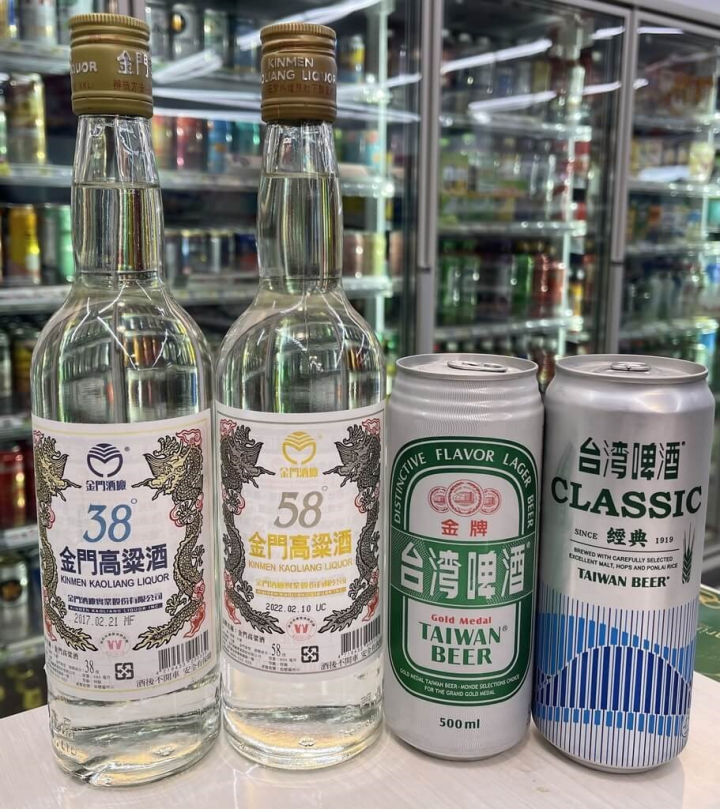
Taipei, Dec. 10 (CNA) China has suspended some shipments of beer, liquor and other beverages from Taiwan, Taiwan officials and affected companies confirmed Saturday, just two days after Taiwanese seafood exporters found themselves locked out of the Chinese market.
According to the website of China's General Administration of Customs, 11 out of 28 beer and distillery items registered by Taiwanese exporters face shipment suspension starting Friday, with the affected suppliers including Taihu Brewing, Kinmen Kaoliang Liquor Inc., King Car Food Industrial Co., Legend Brewery Co., Win Shan International Co. and state-own Taiwan Tobacco & Liquor Corp. (TTL).
In addition, shipments of 123 out of 354 beverage items registered by Taiwanese exporters have also been suspended, with companies affected including HaySong, Vitalon Foods, Uni-President Enterprises, Taisun Enterprise, Oceanic Beverages and King To Nin Jiom Medicine, the Chinese agency's website showed.
The suspension of beer, liquor and beverage shipments from Taiwan came just two days after the Chinese customs authorities banned imports of Taiwan's seafood, citing a failure to comply with a new customs registration system the Chinese authorities introduced last year.
Exporters of squid, Pacific saury and fourfinger threadfin are most affected.
In the latest case, the registration of some of the affected Taiwanese beer, liquor and beverage exporters was not due to expire until 2026 or 2027.
Commenting on the ban on Taiwan's seafood, Zhu Fenglian (朱鳳蓮), a spokeswoman with China's Taiwan Affairs Office, said on Friday that the new registration system, which was introduced in April 2021 in a bid to enhance food safety, became effective on Jan. 1, 2022.
Zhu said some of Taiwan's food exporters failed to provide full information under the new registration system so they were unable to secure approval to ship their products to China.
She said it was a normal monitoring mechanism for a country to protect its food safety and urged suppliers to provide necessary information to register.
Cheng Wei-chih (鄭維智), head of the Taiwan Food and Drug Administration's (FDA) food section, on Saturday confirmed the latest ban on Taiwan's beer, liquor and beverages with local media.
Cheng said the FDA received a notice from the Chinese customs authorities late Friday afternoon, which said the affected Taiwanese exporters failed to provide necessary information in their registration.
However, the Chinese side did not respond to a question from the FDA about what information was missing and such an unclear situation has caused trouble for these companies, Cheng said.
He said any company affected by the situation can call the FDA's toll-free line, 0809-099-908, for help.
In response to the ban, Kinmen Kaoliang Liquor Inc. Spokesman Chen Qi-zhan (陳啟展) said at a press conference Saturday that his company secured a qualification code from the Chinese customs service as early as Dec. 28 last year, which is supposed to be effective until Dec. 28, 2026.
However, on March 24, Taiwan's National Treasury Administration informed the company that it needed to provide additional information, including the origin of its raw materials, by April 30, which the company did before mid April, Chen said.
The information was passed to China via Taiwan's FDA, he said, adding that the response his company received on Aug. 1 was that "the relevant logos and texts of the declaration of origin and other documents do not meet the requirements..."
He said his company then quickly submitted the relevant documents needed and stressed that the suspension would not negatively affect its operations in China for the time being.
Taiwan Tobacco & Liquor Corp. (TTL), another company affected, said it also adhered to Chinese customs rules for registration and secured a qualification code in January, citing a notice from the Chinese customs authorities.
Later, it was informed that its registration had become "invalid" and was required to provide the necessary information by the end of August, which it did, TTL said.
At the beginning of September its registration had been shown as "valid" on the Chinese customs agency's website, TTL said, adding it had no idea why its qualification code became invalid on Dec. 9.
The Taiwanese company said the shipment suspension, involving brewing and distillery items, will affect its imports planned for December and is expected to cost the company about NT$1.3 million (US$42,483), adding that while the loss appears minor, it will seek a clarification from the relevant Chinese authorities to protect its interests.
In addition to the China market, TTL said it also sells its products in other markets such as South Korea, the United States, the European Union and the Middle East, so the impact from the shipment suspension is expected to have only a limited impact on the company's operations.
A source from TTL told CNA that the company had faced barriers to its shipments as early as last year when it shipped Kaoliang liquor to Fujian Province, but now it faces even more restrictions with the qualification code for its shipments of brewing and distillery products being revoked.
Meanwhile, Premier Su Tseng-chang (蘇貞昌) said the government will try its best to help these affected Taiwanese exporters.
Su said China's ban on shipments of Taiwan-made beer, liquor and beverage by using administrative barriers contravened the rules of the World Trade Organization (WTO), and Taiwan's government will communicate with the relevant Chinese authorities to resolve the unfavorable situation.
Taipei Mayor Ko Wen-je (柯文哲) on Saturday called on Beijing authorities to rethink its import bans, saying such a move is likely to increase dislike of China in Taiwan and exacerbate already deteriorating cross-strait relations.